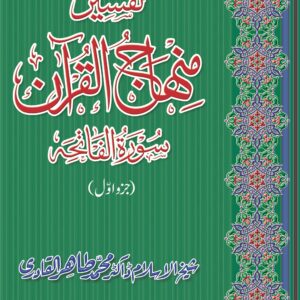Volume 1: Contents Page and Index of Qur’anic Topics
The first volume consists of the contents page which alone consists of about 400 pages. A quick glance over the contents pages gives a general overview of the encyclopaedia. For the benefit of the reader, the thirty chapter-headings have been listed separately to give the reader an overview of the encyclopaedia’s structure. This is followed by a summarised version of the contents page, which includes the subheadings of each chapter. Hopefully, this will facilitate the reader to navigate the contents of the encyclopaedia with ease.
In the first volume, there is also a comprehensive index of the topics covered in the Qur’anic Encyclopaedia. The required topic can be accessed by merely searching for the main entry in the alphabetical arrangement. For example, if the topic ‘creation of the universe’ is required then the entry ‘creation’ would be searched under the letter ‘C’. In this way, it will facilitate the reader to find the desired topic with ease.
Volume 2: Belief in God; Belief in Prophethood and Belief in the Divinely Revealed Books
The second volume consists of subjects pertaining to the existence of God, the concept of Divine Oneness (tawhid) and God’s being and attributes. Arguments are given to prove the existence of God. Some examples of these are: the origination of the universe ex-nihilo, the purpose of creation, the orderliness of the solar system, the alternation of the night and day, the evolution of the embryo in the womb, the expanses of the heavens and the earth, the creation of the mountains and oceans and the philosophy of life and death.
This volume also consists of verses pertaining to the greatness of God’s names, the reality of shirk (idolatry), the attitude and mentality of the idolaters, one’s relationship with God, ones duty to worship, love and trust in Him, having a good opinion of Him, having sincerity in one’s beliefs, the importance of God’s remembrance and highlighting the attacks against a person’s faith, among other important matters pertaining to belief in God.
After discussing belief in God, other subjects pertaining to beliefs are discussed, such as belief in Messengership, covering one’s belief in all the Prophets, with an extensive focus on belief in the Messengership of Prophet Muhammad (blessings and peace be upon him) and the finality of his Prophethood. The unique qualities of the Prophet (blessings and peace be upon him) are covered in depth along with Qur’anic injunctions on loving, following and respecting the Messenger (blessings and peace be upon him). Answers from the Qur’an are given to the objections of the idolaters and disbelievers against the Prophet (blessings and peace be upon him).
In relation to belief in the divinely revealed books, the virtues and unique qualities of the Torah, Psalms, Gospel and Qur’an are detailed in light of the Qur’anic verses, along with evidence for the truthfulness and veracity of the Qur’an and its divine safeguarding. God has declared the Qur’an to be solemn advice, guidance and mercy for mankind. This divine, universal and all-embracing message has been given special prominence in this volume
Volume 3: Belief in the Angels, the Divine Decree and Life after Death; Different Types of Worship: Marriage and Family Law; the Halal and Haram and Rights and Responsibilities
The third volume continues with the subject of belief in the divinely revealed books, such as the topics of respecting and revering the Qur’an, the blessings attained in adhering to it and the supplications of the Prophets (peace be upon them). After this, it then moves onto other areas of beliefs such as belief in the angels, the divine decree and life after death.
Some of the verses concerning belief in the angels, include verses on their existence, duties and the names of some prominent angels, such as Angels Jibril, Mika’il, Israfil, Harut and Marut, Kiraman Katibin and the Angel of Death. The existence of the Jinn is also mentioned as well as the reality of the Shaytan (Satan) and his enmity to the God-fearing people. Hopefully, this will motivate the reader towards the practice of pious deeds and abstaining from sin. There are verses pertaining to the Divine Decree (Qadr). Concepts such as the predestination of good and evil, and the concept of predestination held by the disbelievers and idolaters are covered.
Following on from this, belief in life after death, resurrection, the accountability and other related topics are also covered under dozens of subject headings, such as the events of the Day of Judgement, description of Paradise and its inhabitants, description of Hell and its denizens. The general knowledge of the lay Muslims regarding the life hereafter, the hardships and accountability of the Day of Judgement and the subsequent punishment and reward, is attained through the stories and accounts they hear from preachers. Through the Qur’anic Encyclopaedia, people of all academic abilities will be able to gain direct knowledge from the Qur’an about these realities.
After discussing belief in God, the different types of ritual worship are discussed such as the ritual prayer, fasting, the alms-due, charity, the Pilgrimage and the Visitation. Verses pertaining to their obligation and importance have been given as well as those that warn people who fail to practice them.
This volume also delves into family law, such as marriage and divorce, the veil, the rights of men and women, the wife’s right to separation (khula‘), the rights of widows and the injunctions pertaining to the waiting period (‘idda). In addition to family law, verses pertaining to the halal and haram are also given highlighting the things that are either permitted or prohibited in the Sharia.
The volume concludes with a chapter on the individual’s rights and responsibilities. The rights of parents, women, relatives, orphans, the poor and needy, neighbours, guests, employees and prisoners have been covered with reference to many Qur’anic verses, the study of which will be beneficial for not only lay people but also for lawyers and people involved in social work.
Volume 4: Knowledge; Science; Peace, Love and Non-Violence; World Religions and Stories of the Prophets (peace be upon them)
The fourth volume begins with a chapter on the importance of seeking knowledge and pursuing scientific discoveries. Scientific realities, such as the chemical and biological evolution of the human body, the creation of a baby in the womb and its stages of development, the determination of gender in the womb, five senses, the wisdom behind fingerprints and the scientific aspects of the creation of the universe are mentioned. The scientific aspects of the creation of the heavens and the earth and the sciences of psychology, astronomy, meteorology, botany, biology and ecology among others are from the unique features of this volume. These subjects are of importance to the ordinary reader as well as scientists, engineers and medical doctors.
This volume also covers subjects pertaining to peace and love, social reform, the sanctity of human life, condemnation of sectarianism, the importance of and need for the unity of the Umma, good conduct with non-Muslims and the protection of their lives, property and places of worship. It also covers world religions and other important topics, such as the stories of the Prophets (peace be upon them) and the accounts of past nations. The relating of these stories and accounts provides admonition to the reader. All regions and cities that are mentioned in the Qur’an are also covered at the end of this volume.
Volume 5: The Prophet’s Family and Companions (may Allah be well pleased with them); Character; Politics; Economics; Human Nature; Jihad and the Chronicles of the Prophet’s Battles
This fifth volume contains Qur’anic verses concerning the respect and reverence for the Companions (may Allah be well pleased with them), the family of the Holy Prophet (blessings and peace be upon him), the Saints (awliya’ Allah) and righteous. It also contains verses on the importance and excellence of good character and the condemnation of bad character, the study of which will facilitate Muslims in being good human beings. In addition to this, other subjects that are covered in this volume include: injunctions and rulings from the Qur’an concerning anarchists, rebels and terrorists, the sanctity of human life and the importance of interfaith harmony and human freedom.
In this volume, under the section of government and politics, the following subjects are covered: Islamic system of governance, responsibilities of the state and the system of justice. Under economic and financial matters, the following areas are covered: principles of trade and industry, prohibition and condemnation of usury, the concept of taxes and other related subjects that are of interest to economists.
In addition to the above, human nature, its states and temperament, nations of the world and their circumstances, the different states and conditions of the human heart, the impermanence of human life, tourism and the principles and methodology of propagation are also covered. Factors that lead to the rise and fall of nations, injunctions on Jihad and self-defence, injunctions on peace and reconciliation, the chronicles of the Prophet’s battles, their background, causes and scenarios are also covered under assigned subject headings.
Volumes 6 to 8: Comprehensive Index of Qur’anic Words
The sixth, seventh and eighth volumes contain a comprehensive index of Qur’anic words. This index will facilitate in accessing the shoreless oceans of meaning in the Qur’an. Although there are other lexicons available on the Qur’an, this current work is unique in that it is designed for non-Arabic speakers. In other Qur’anic lexicons, the root word must be known to access the lexicon, thus making it difficult at times for those unfamiliar with Arabic morphology. Knowledge of Arabic morphology is not required for the index of Qur’anic words in the Qur’anic Encyclopaedia, as the word can be accessed easily by looking it up alphabetically. For instance, for the word ‘ya‘lamun’, knowing its root word is not required but the word can be searched alphabetically under the section ‘ya’’.
Another useful feature of the index of Qur’anic words is that the number of repetitions of any given word and the verses in which that word is contained are also provided. Moreover, translations of every word have also been given. However, instead of providing a detailed explanation of the word’s meaning, only a basic translation has been provided. For example, the word ‘anzalna’ has the literal meaning of ‘we sent down’ or ‘we revealed’, but it could also come in the meaning of ‘we created’ (Cf. 7:26). This specific conjugation has been mentioned in forty Qur’anic verses, and all forty verses have been listed under the entry of this word.
The last three volumes of the Qur’anic Encyclopaedia, along with being an extensive index of Qur’anic words, also serve the purpose of bringing new subjects to light as every word has been indexed. For example, if one requires verses containing words such as water, fire or river, they will find all the verses with these words under their relevant entry. In this way, thousands of other words and the verses in which they are contained can be accessed easily thereby facilitating the reader.














Reviews
There are no reviews yet.